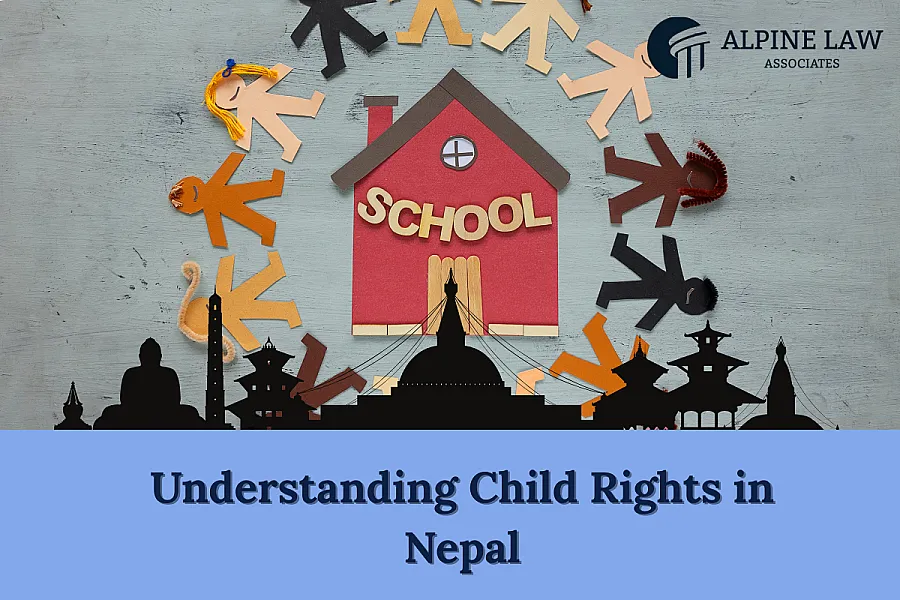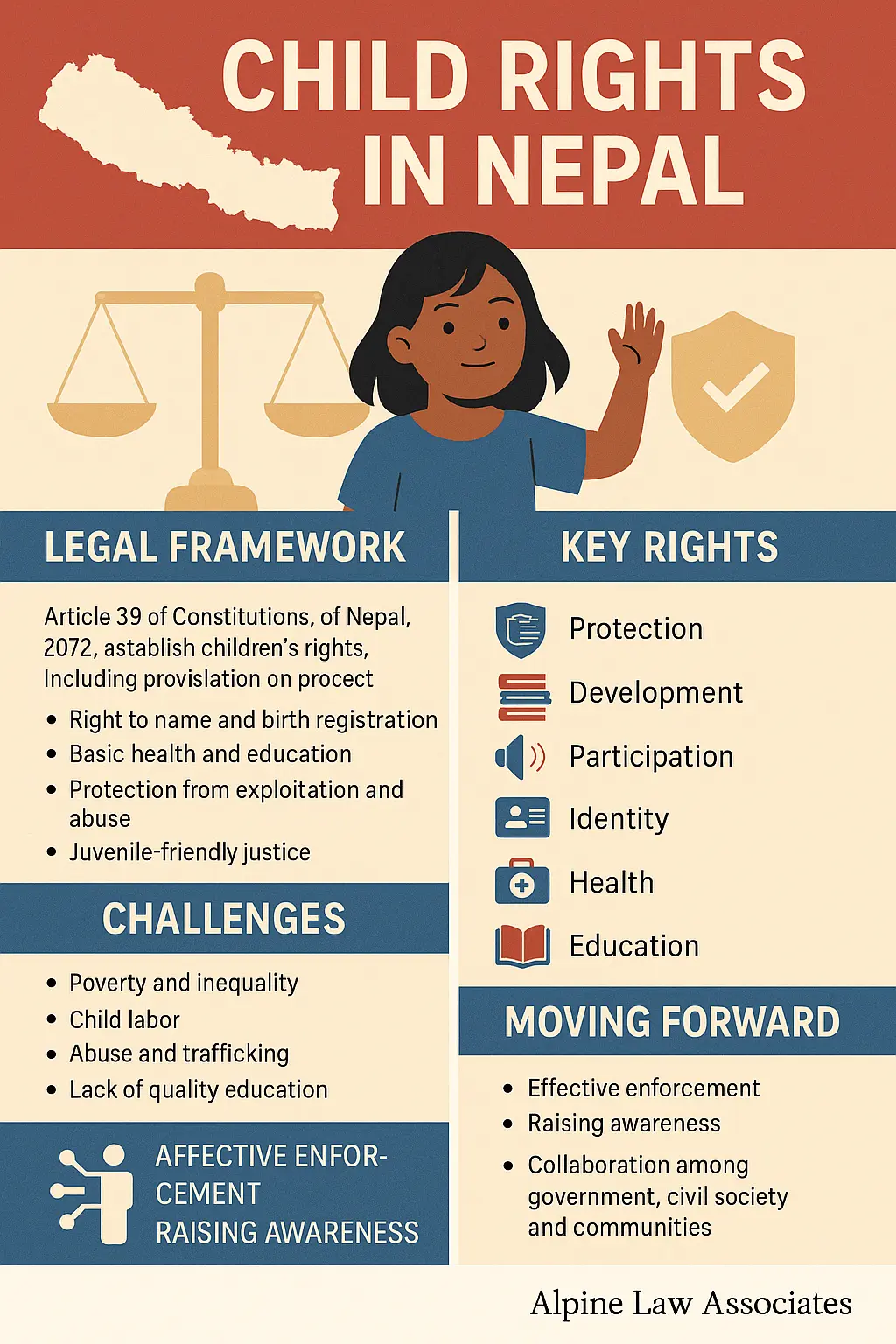
Table of Contents
Child rights in Nepal have been a growing area of focus in recent decades, especially as the country strives to align its laws and policies with international human rights standards. As a signatory to the United Nations Convention on the Rights of the Child (CRC) since 1990, Nepal has taken important legal and institutional steps to promote and protect the rights of children. These rights include the right to survival, protection, development, and participation, which are essential for ensuring a safe and nurturing environment for every child. Despite progress, many children in Nepal still face challenges such as poverty, child labor, lack of access to quality education and healthcare, and various forms of abuse and exploitation. Addressing these issues requires not only strong legal frameworks but also active implementation, public awareness, and coordinated efforts from the government, civil society, and the international community.
Legal provisions for protecting rights of children in Nepal
Article 39 of constitution of Nepal, 2072:
- Every child shall have the right to name and birth registration along with his or her identity.
- Every child shall have the right to education, health, maintenance, proper care, sports, entertainment, and overall personality development from the families and the State.
- Every child shall have the right to elementary child development and child participation.
- No child shall be employed to work in any factory, mine, or engaged in similar other hazardous work.
- No child shall be subjected to child marriage, transported illegally, abducted/kidnapped, or taken hostage.
- No child shall be recruited or used in the army, police or any armed group, or be subjected, in the name of cultural or religious traditions, to abuse, exclusion or physical, mental, sexual or other form of exploitation or improper use by any means or in any manner.
- No child shall be subjected to physical, mental, or any other form of torture in the home, school, or other place and situation whatsoever.
- Every child shall have the right to juvenile-friendly justice.
- The helpless child, an orphan, with disabilities, a conflict victim, displaced, or vulnerable, shall have the right to special protection and facilities from the State.
- Any act contrary to the above clauses shall be punishable by law, and a child who is the victim of such an act shall have the right to obtain compensation from the perpetrator, in accordance with law
Act relating to Children, 2075
Right to live:
Every child has the right to live with dignity and respect. To protect this right, the Government of Nepal at all levels, federal, provincial, and local, must take necessary actions to provide safety, prevent accidents, reduce risks, and support the overall development and well-being of children.
Right to Name, Nationality, and Identity:
Every child has the right to a name, identity, and birth registration. Parents must name and register their child after birth as per the law. In special cases, like children born from rape or incest, the mother may choose to register the child with only her name. If parents are unavailable, a guardian or family member can name the child. Children may use the surname of either parent, both, or a guardian, depending on circumstances. If the child’s parents are unknown, the guardian must notify child welfare authorities when naming the child. No one is allowed to change a child’s name or surname to hide their identity for personal gain.
Right Against Discrimination:
No child should face discrimination based on religion, caste, gender, language, disability, family background, economic status, or similar factors. All children must be treated equally in terms of care, education, and health, regardless of whether they are sons or daughters, born to previous or current spouses, adopted, or born before or after marriage.
Right to Live and Meet with Parents:
A child cannot be separated from their parents against their will, except when the Juvenile Court deems it necessary for the child’s best interests. In such cases, the parents must be given a chance to explain before a decision is made. If separated, the child still has the right to regularly meet and stay in contact with their parents, unless restricted by the Court. Adopted children and those in alternative care also have the right to meet and communicate with their biological parents or family.
Right to Protection:
Every child has the right to proper care, love, and protection from their parents, family members, or guardians. Both parents are equally responsible for the child's upbringing, even if separated. No child should be abandoned or left unattended. Children with disabilities or in vulnerable situations are entitled to special state protection. Children must be protected from violence, abuse, exploitation, harmful labor, and activities that hinder their development or education. They cannot be used in armed forces, political purposes, or in dangerous work. The government at all levels must take necessary actions to ensure children’s safety and well-being.
Right to Participate:
Every child who is capable of forming their own opinion has the right to take part in decisions that affect them, whether in the family, community, school, or other institutions.
Right to Freedom of Expression and Information:
Every child has the right to express their opinions and to seek and receive information related to their rights, interests, and concerns, in accordance with the law.
Right to Open Organization and Assemble Peacefully:
Children have the right to form child clubs or organizations and to gather peacefully to promote and protect their rights. The process for establishing such organizations will be defined by law.
Special Rights of Children with Disabilities:
Children with disabilities are entitled to special arrangements and care to support their dignity, independence, and active participation in society. They have the right to access education, healthcare, training, rehabilitation, employment preparation, and entertainment. They must also have equal access to and use of public services and facilities.
Right to Nutrition and Health:
Every child has the right to proper nutrition, clean drinking water, and breastfeeding up to the age of two. Children and pregnant women are entitled to vaccinations, health services, and age-appropriate information on body and reproductive health. All children have the right to free basic health services.
Right to Sports, Entertainment, and Culture:
Every child has the right to play and participate in sports based on their age and interest. Schools must promote sports by providing proper playgrounds and equipment. Children also have the right to age-appropriate, child-friendly entertainment and to participate in cultural activities according to their religion, customs, and beliefs, as long as it does not harm their well-being.
Right to Education:
Children under six have the right to early learning suited to their age and development. All children are entitled to free and compulsory education up to the basic level, and free education up to the secondary level in a child-friendly environment. Education should be provided using appropriate methods and materials, especially for children with special physical or mental conditions. Dalit children have the right to free education with scholarships as per the law.
Nepal has made commendable progress in recognizing and securing the rights of children through constitutional and legal provisions aligned with international standards. Laws such as Article 39 of the Constitution and the Children’s Act, 2075, guarantee fundamental rights including protection, education, health, identity, and participation. These rights aim to ensure every child grows up in a safe, inclusive, and nurturing environment. However, challenges such as poverty, discrimination, and lack of enforcement persist. Effective implementation, awareness, and collaboration among the government, communities, and stakeholders are essential to transform these legal rights into meaningful, everyday realities for all children in Nepal.
Disclaimer:
This article is intended solely for informational purposes and should not be interpreted as legal advice, advertisement, solicitation, or personal communication from the firm or its members. Neither the firm nor its members assume any responsibility for actions taken based on the information contained herein.


